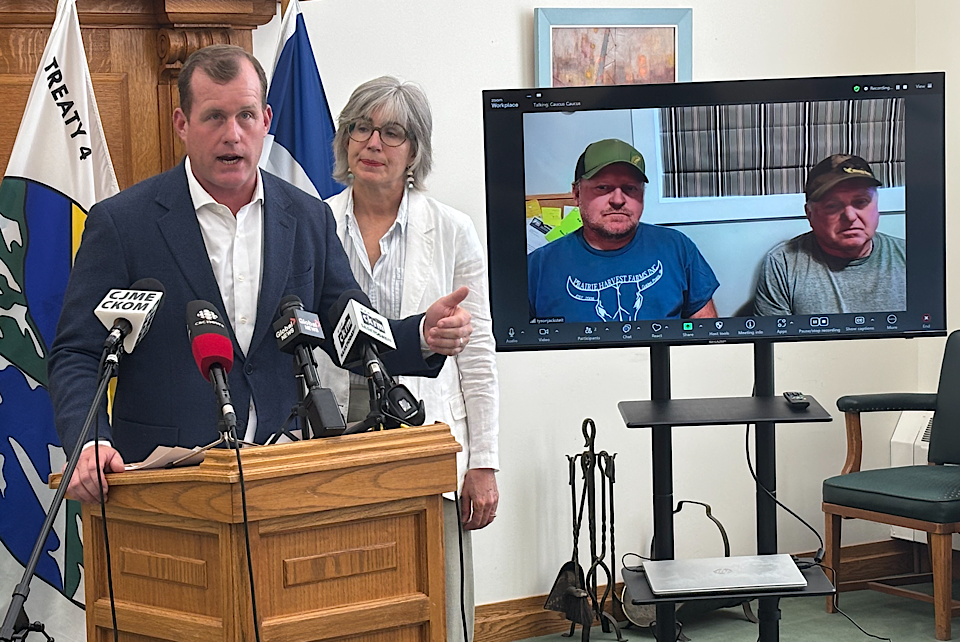REGINA — A grim drought situation in the R.M. of Big Stick was highlighted at the Legislature by opposition New Democrats.
At a news conference Wednesday, NDP critics Trent Wotherspoon and Erika Ritchie were joined via video by Reeve Quinton Jacksteit and Councillor Tyson Jacksteit from the R.M. of Big Stick, a region hard hit by drought conditions.
Wotherspoon said the NDP, along with local producers and municipalities, are demanding the government “act quickly to provide relief and long-term protections and measures for producers in the rural municipality of Big Stick and surrounding drought-stricken areas in the southwest.”
“Big Stick and several neighbouring R.M.s in the southwest have declared states of emergency this season after nine years of consecutive drought.”
Wotherspoon said he, Ritchie and other members of their team had met with Big Stick and neighbouring municipalities and producers in the southwest. While federal and provincial governments have made some improvements to AgriStability, he said the supports available “just don’t come close to responding to the severity of drought that Big Stick and the region is experiencing.”
He told reporters the situation has been protracted for many years, pointing to burnt crops, nonexistent feed and grass, and local data, including yield and rainfall, showing that the nine years of drought were worse than the 1930s.
Ritchie told reporters the NDP has “reiterated calls for a drought action committee, a joint committee that would involve impacted producers that would focus on strengthening business risk management programs and emergency measures that address the unique situation that producers have been experiencing after nine years of consecutive drought.
“We are also reiterating calls for a 10-year deferral on taxes for producers forced to sell breeding stock due to drought. This is about our future. Producers like Tyson and Quinton are the very backbone of the Saskatchewan economy and their operations have been proudly built by families for generations. We need to have their backs now so they can make it through and keep driving our economy forward and delivering the world-class agricultural products that Saskatchewan is known for.”
Tyson Jacksteit, who is also a producer, said that since July “we have had some rain and yes, that is true, things have improved. But the one thing that hasn’t improved is our crops were really dismal before the rain and they’re still dismal.”
“We came from the combine this morning. We farm about 7,500 acres and our crops are averaging anywhere from 3 to 6 bushels an acre. The top is maybe 10. And we’re dealing with weed-infested fields. It’s not a good time. The yields are poor. And every day we also get daily grain prices. We’re watching our grain prices daily drop significant amounts. So that’s a whole other story. But where this whole situation does fall short is through crop insurance.
“A lot of the producers in the area are probably sitting around that $150, maybe $175 an acre guaranteed for coverage. And that is significantly short of what producers need.”
He said they have had consultations with crop insurance and local governments, but “all this is falling on a deaf ear.”
“The last meeting we had with crop insurance was probably a month ago. We have not heard a thing.”
Quinton Jacksteit added that after looking at grain prices that morning, “some of our best germ is running 10 bushels of nature. The number two germ today is like the closest grain point to $7.84. So that gives me $78.40 in my production this year. I haven’t even trucked it there. That doesn’t even cover my fertilizer bill. So, you know, we’re in dire straits.
“And as for rainfall, we have received some, like Tyson had mentioned, but my farm received roughly about four inches in the month of July. So we are nowhere near out of this drought.”
Asked if they had reached out to federal representatives on changes needed to crop insurance and tax deferrals, Wotherspoon said:
“So we’ve been clear and public in those calls to both the provincial and the federal government. The province has failed to step up and to make that case. There were some adjustments that were made to AgriStability earlier in the summer. These were calls that we had supported, calls that we had made that had come from the agricultural sector and community. But those calls don’t respond to this area that’s facing these nine years of protracted drought.”
He also accused provincial Agriculture Minister Daryl Harrison of “sitting on the sidelines. And it’s disingenuous for him to suggest that the changes that were made earlier in the summer respond to the dire situation that these producers face because he should know full well as a producer that they don’t.”
In a statement, the provincial government pointed to several programs in place for producers to mitigate the impacts of dry conditions, with $12 billion in coverage through the Crop Insurance Program.
Among the enhancements were implementing the double low-yield appraisal for this year, allowing producers to divert low-yielding crops to feed; extending the AgriStability enrolment deadline, increasing the compensation rate from 80 to 90 per cent and doubling the payment cap; and announcing the Crown Grazing Lease Rental Reduction Program.
“These programs support our producers, providing over $7 billion in the last four years. Our government continues to listen and work alongside producers, stakeholders and industry associations to ensure we continue to provide the support they need,” the government stated.
“After claiming earlier this week that the province is spending too much, the lost, reckless, and dishonest NDP are now asking for additional financial commitments. They need to clarify their position to the people of Saskatchewan.”



